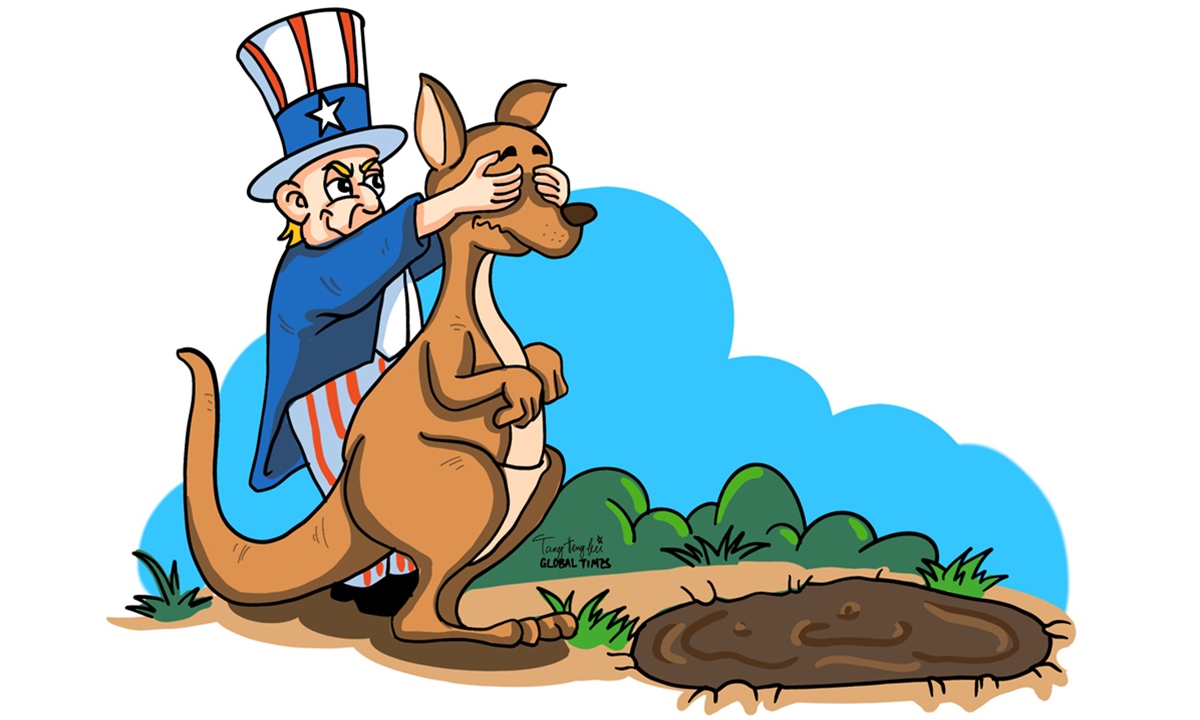
Illustration: Tang Tengfei/GT
"If China wants to wage war with us, if we join the US in this region [the Taiwan Straits], we will be over and done within about two days," said Australia's Liberal Senator Jim Molan during a recent interview with Sky News Australia. Molan also expressed concerns that Washington will not engage in such a war and the US "hasn't won a war game in the last couple of years over a Taiwan scenario," leaving "collateral damage" to Australia.
This is not the first time Molan has hyped up war. In December 2020, he said it's "more likely than currently recognized" that China will go to war with the US and Australia should get prepared.
Jim Molan's latest words seem to indicate that he has realized that blindly following the US into conflicts with China means great danger to Australia.
Certain Australian politicians were obsessed with instigating opposition, exaggerating the threats of war, and viewing international relations from the perspective of military and confrontation. Such incitements of confrontation has led to more troubles and difficulties for China-Australia relations.
For example, former defense minister Christopher Pyne warned that "Australia will likely be dragged into a war with China in the next five to 10 years"; Defense Minister Peter Dutton said a conflict involving China over the island of Taiwan "cannot be discounted"; Home Affairs Department Secretary Mike Pezzullo even said free nations "again hear the beating drums" of war, as military tensions in the Indo-Pacific rise.
Exaggerating the threat of war shows that some Australian politicians are still full of outdated Cold War mentality. By doing this, they are trying to gain political benefits and show how much they "care" about their own country in the context of the difficulties in China-Australia relations.
The US is a major reason behind Australia's increasing war talks. After WWII, Australia followed the US in armed interventions or invasions of other countries, including South Korea, Vietnam and Afghanistan.
"Australia believed that China will not be involved in direct confrontation with the US after the Cold War, so it had no fear. But now, with China's rise, Australia has realized that China will not submit to an insult anymore and there is a risk of direct conflict. Therefore, Canberra wants to test China's reaction to war talks and see if China is determined to confront the US," Yu Lei, chief research fellow at the research center for Pacific Island countries of Liaocheng University, told the Global Times on Wednesday.
By expressing concerns that Washington will not engage in such a war and saying the US "hasn't won a war game in the last couple of years over a Taiwan scenario," Molan has shown his suspicion of US military power. With the continuous development of China, the US' military edge in the Asia-Pacific region is slowly shrinking.
Meanwhile, Australia also has some doubts about the US' resolve to act: Is Washington determined enough to defend Canberra? "Some Australia politicians have realized that helping the US to test China's bottom line may face China's armed counterattack. Therefore, they intend to see the US' response to test whether it has enough will to support Australia," Yu said.
Australia has long benefited from reciprocal cooperation with China. Hyping the threat of large-scale military conflict not only affects Canberra's decision-making, but is also inconsistent with the facts and is immoral. Now that some Australian politicians are aware of the US' unreliability, they should focus on the development of their own strength, instead of sensationalizing the situation and making noises that harm China-Australia relations.
The author is a reporter with the Global Times. opinion@globaltimes.com.cn




